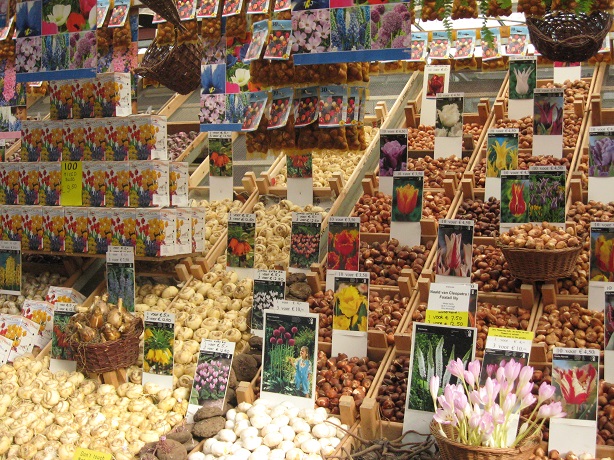Submitted by GAtherton on 29 June 2017

Researchers in Manchester are questioning the legal use of certain fungicides used on imported flowers and bulbs following evidence that they induce resistance to the drugs used to treat patients with Aspergillus fumigatus, a virulent type of fungal disease.
One of the first countries of the world where researchers suggested the generation of triazole antifungal drug resistance originates in the environment was the Netherlands which is a world leader for the production of plant bulbs, with almost nine billion bulbs, mostly tulips, exported every year. These bulbs are sold throughout the world with major markets in the US, Japan, China, EU and Russia.
Professor Malcolm Richardson, Director of the Mycology Reference Centre at the University Hospital of South Manchester, Wythenshawe Hospital, Manchester, UK says the transfer of azole resistance on bulbs from the world’s resistance hotspot in the Netherlands has an “Armageddon feel to it” for the many millions of patients on or requiring anti-Aspergillus therapy.
He explains; “Five azole fungicides induce resistance in A. fumigatus and can still be legally used on bulbs – is this sensible from a public health perspective? With no backup agents available orally, and the massive proliferation potential of Aspergillus, this problem needs urgent attention from public health authorities, who have been silent to date.”
In March, a team of researchers from Trinity University, in Dublin examined samples of plant bulbs imported into Ireland from the Netherlands. Samples taken from 2014, 2015 and 2016 all bore isolates of A.fumigatus that had resistance to one or more triazole antifungal drug. Quite apart from the risk to people handling these bulbs this is a clear example of how resistant strains can be spread from country to country.
This is not a problem restricted to Europe. Colombia is the second most prolific exporter of cut flowers in the world. It is also a heavy user of triazole fungicides and a team of researchers from Columbia, France and Holland also detected triazole resistant strains of A. fumigatus in 9 per cent of samples taken from soil collected from places where flowers are grown.
Professor Richardson and his team believe these reports provide clues as to how resistant strains are being generated and spread. and why they are now present on all six continents of the world, but there are likely to be many more examples when we consider the amount of trade in materials likely to be contaminated with Aspergillus fumigatus that is exchanged internationally every day, and the amount of use of triazole fungicides for agricultural purposes throughout the world.
For more information please contact Sean Curtis- Ward at The Goodwork Organisation on 0208 747 1488 or mobile 07836 690318.
NOTES TO EDITORS
The availability of triazole antifungal drugs has had a huge impact on the treatment of serious fungal diseases such as Invasive Aspergillosis (IA), Chronic Pulmonary Aspergillosis (CPA) and are starting to have a positive impact on severe forms of asthma [1]. The first such drugs became available in 1997 (itraconazole) and several more are now available to clinicians (e.g. voriconazole, posaconazole and isavuconazole ) and are used extensively, collectively referred to as triazole antifungal drugs. Several millions of patients rely on treatment with triazole antifungals every year worldwide.
Antifungal drug resistance in Aspergillus fumigatus (the species that causes the most serious infections) is emerging as a significant risk factor when treating patients for acute and chronic serious fungal infections. Mortality rates for patients with IA are high (40-60%) when infected with an antifungal sensitive strain of A. fumigatus, but can reach 88% where resistance is detected[2].
An established route for the generation of antifungal resistance in the clinic would begin when infected patients are treated with a triazole. Once the infecting fungus is exposed to a triazole in vivo in time it can result in the outgrowth of a triazole resistant strain of A. fumigatus. However doctors have noted strains of triazole resistant A. fumigatus in patients who had NO prior exposure to antifungal drugs suggesting that there is an additional route for resistance acquisition.
Evidence has been rapidly accumulating that some strains of antifungal drug-resistant Aspergillus fumigatus originate in the environment and are associated with widespread and heavy agricultural use of triazole fungicides to protect crops from fungal infection 1. Inhalation of the spores of these fungi automatically renders treatment with some or all triazole antifungal drugs ineffective, with grave possible consequences.
1. Verweij, P.E., et al., Azole Resistance in Aspergillus fumigatus: Can We Retain the Clinical Use of Mold-Active Antifungal Azoles? Clinical infectious diseases : an official publication of the Infectious Diseases Society of America, 2016. 62(3): p. 362-8.
2. Denning, D.W. and P. Bowyer, Voriconazole resistance in Aspergillus fumigatus: should we be concerned? Clinical infectious diseases : an official publication of the Infectious Diseases Society of America, 2013. 57(4): p. 521-3.
3. Ribas, E.R.A.D., et al., Is the emergence of fungal resistance to medical triazoles related to their use in the agroecosystems? A mini review. Brazilian journal of microbiology : [publication of the Brazilian Society for Microbiology], 2016. 47(4): p. 793-799.
4. uk.ibulb.org. The flower bulb sector within an international perspective. 2017 [cited 2017 June 2017]; Available from: http://uk.ibulb.org/275/the-flower-bulb-sector-within-an-international-perspective.html.
5. Dunne, K., et al., Inter-country transfer of triazole-resistant Aspergillus fumigatus on plant bulbs. Clinical infectious diseases : an official publication of the Infectious Diseases Society of America, 2017.
6. Alvarez-Moreno, C., et al., Azole-resistant Aspergillus fumigatus harboring TR34/L98H, TR46/Y121F/T289A and TR53 mutations related to flower fields in Colombia. Scientific reports, 2017. 7: p. 45631.
News for the press archives
-
Title
Date
